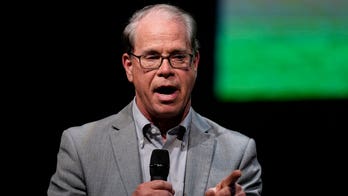SACRAMENTO, Calif. – Gov. Jerry Brown on Sunday announced signing a bill that could one day bring the release of some criminals who were sentenced as juveniles to life in prison.
There are 309 inmates serving life-without-parole sentences in California for murders committed when they were younger than 18.
Brown signed SB9, by Democratic Sen. Leland Yee of San Francisco. It would let the inmates ask judges to reconsider their sentences after they serve at least 15 years in prison.
Judges could then reduce the no-parole sentence to 25 years-to-life if the inmate shows remorse and is taking steps toward rehabilitation.
Yee said his bill recognizes that young people's brains and impulse control grow as they age. His bill was opposed by the state's major law enforcement and victims' organizations.
"I am proud that today California said we believe all kids, even those we had given up on in the past, are deserving of a second chance," Yee said in a statement.
California is one of 39 states that allow judges to sentence minors to die in prison. More than 2,570 people convicted as juveniles are serving life sentences without the possibility of parole in the U.S., according to the Youth Justice Coalition, an Inglewood-based group concerned with the treatment of juvenile offenders.
The U.S. Supreme Court recently struck down mandatory life without parole sentences for juveniles as unconstitutional "cruel and unusual" punishment. But the ruling didn't affect California's law because it already gives judges the discretion to impose a sentence of 25 years-to-life.
Opponents say the bill is unfair to victims' families. Allowing the possibility of parole would force the survivors to relive their experience as they fight against parole.
"Before, we had life without possibility of parole -- without," said Maggie Elvey of Sacramento, who helped organize opposition to the bill. "It's so sad that they're taking the justice away."
She said survivors like herself were told that their loved one's murderers would never be released from prison.
"It's not fair to go retroactive back to all those killers," she said.
Yee struggled for a year to get the bill through the Legislature over opposition from organizations representing police chiefs, sheriffs, prosecutors, victims and many rank-and-file law enforcement officers. He had support from some individual law enforcement officials, notably San Francisco District Attorney George Gascon, Police Chief Greg Suhr and interim Sheriff Vicki Hennessy.
It was his third attempt in five years. He succeeded in getting it through the Legislature this year, with no Republican votes, only after amending the bill to exclude young offenders who tortured their victims or killed a law enforcement officer or firefighter.
The exemptions are not enough to satisfy survivors such as Elvey.
"Victims hate that, when they say that one person's loved one is more important than another," Elvey said.
Her husband, Ross, was murdered by two teens during the robbery of his gun shop in Vista, Calif.
"They held Ross down on the floor and just kept beating and beating him," she said.
He was in a coma for 41 days before he died on June 7, 1993.
"They're all violent, brutal murders," she said. "That's why they got this sentence."
However, University of Southern California law professor Heidi Rummel, director of the university's Post-Conviction Justice Project, said children are different from adults and deserve to be treated differently under the criminal justice system.
"Their brains are still developing. They are impulsive, vulnerable to peer pressure and often victims of their life circumstances. But most importantly, they have a much greater capacity to grow and change," she said in a statement. She will supervise law students who will represent 12 juvenile offenders seeking resentencing under the bill.
California has more than 10 percent of the nation's juvenile life-without-parole cases, said Elizabeth Calvin, an advocate with Human Rights Watch, which supported the bill along with the American Civil Liberties Union. She said the law should serve as a model for other states.
The bill had the support of numerous mental health and medical associations, along with defense attorneys and church groups. The groups note that some offenders were sentenced to life without parole as accomplices to murder, despite not being the actual killer.
One of them is Christian Bracamontes, who was 16 in 1998 when he and another youth tried to rob another teenager of his marijuana. Bracamontes' friend fatally shot 15-year-old Thomas Williams in Fontana.
Bracamontes turned down a plea deal and was convicted of murder during a robbery with the special circumstance of knowing that a gun would be used. Bracamontes consistently claimed he never expected his friend to fire the weapon or kill Williams.
"A lot of kids don't understand aiding-and-abetting," prosecutor John Davis told The Press-Enterprise newspaper of Riverside when Bracamontes was sentenced in 2000.
Bracamontes is now 31 and serving his life term in California State Prison, Los Angeles County in Lancaster. The shooter, Jose Morales, who was two years older, negotiated a plea deal that eventually could result in his release.
Arturo Macedo, Bracamontes' father, said through an interpreter that for years he has lived without hope of his son being paroled, "and now there is some light."
His son has served 14 years in prison, has a clean record behind bars, and is likely to petition for resentencing, Macedo said.
"He was just there," Macedo said. "He did not kill anybody, he was just there when it happened."
The district attorneys' association notes that virtually all the inmates sentenced to life in prison as juveniles in California were 16 or 17 at the time of the offense and were convicted of first-degree murder with one or more special circumstances. That could have brought them the death penalty had they been older.




